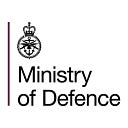Ukrainian Surgeon General says UK’s support for Ukrainian medics is crucial
Nearly 150 Ukrainian soldiers have been trained as combat medics in the UK, as part of a wide-range medical training the UK is delivering to military personnel of the Armed Forces of Ukraine, including reconstructive surgical training and emergent combat surgery training.
Major General Tetiana Ostashchenko, Commander of the Medical Forces of the Armed Forces of Ukraine, visited the UK recently to meet fellow Surgeon Generals and to hear from UK personnel and her own troops about the variety of medical training being delivered to Ukrainians.
The Ukrainian Surgeon General started her visit by attending the 60th plenary of the Committee of Chiefs of Military Medical Services in NATO [COMEDS] where she briefed on the current situation in Ukraine. Speaking to the assembled international audience of NATO Member State and Partner Nations, Maj Gen Ostashchenko stressed the importance of continued support from Allies. She also highlighted the importance of the development of Ukrainian rehabilitation services, to help injured Service personnel return to active duty, which is a task the UK is leading on behalf of the International Community.
Amongst a packed agenda at the three-day event were sessions exploring the medical lessons to be learned from the Ukraine war as well as discussions on the management of mass casualties in larger scale combat operations.
Major General Tim Hodgetts CB CBE, UK Surgeon General and Chair of the Committee of Surgeon Generals in NATO said:
“We are actively sharing experiences through structured surgical training initiatives.”
“The COMEDS 60th Plenary has been a huge success, taking forward our agreed thinking on casualty management at scale when confronted with a peer-on-peer conflict. As Chair COMEDS, I was determined to link the Plenary conference to DSEI, which has provided an unrivalled experience for the Surgeon Generals to collectively engage with industry — our key partners if we are to continue to innovate for clinical advantage.”
Seeing and hearing directly from the Ukrainian personnel undertaking the training, and the UK and international medics delivering it, was a key outcome of the overall visit. During her tour, Maj Gen Ostashchenko travelled to a specialist training camp for Ukrainian combat medics. Since June the UK has been delivering care under fire combat medical training to Ukrainian soldiers. So far nearly 150 Ukrainian soldiers have been taught life-saving medical techniques and strategies for providing battlefield trauma care. This includes medical care under fire, casualty assessment, controlling heavy blood loss, and giving crucial pre-hospital emergency care.
Maj Gen Ostashchenko saw for herself how the UK and its partners — Iceland and the Netherlands — are teaching Ukrainians how to save lives under fire.
The visit also provided an opportunity to hear about the reconstructive surgical training and damage control resuscitation in austere environments that has been delivered to Ukrainian surgeons in recent months.
Brigadier Phil de Rouffignac, Commander for 2nd Medical Brigade who hosted the Ukrainian Surgeon General on her visit to see the combat medical training being delivered to Ukrainian medics said:
“It has been an absolute privilege and honour to have her here with us over the past day and a half. She’s had a chance to meet the training team, receive briefs from all those international agencies engaged in supporting Ukraine, and see demonstrations of the combat medical training, including seeing the military medical bergens that we issue to those returning to the front line, and to see some practical demonstrations of casualty care under realistic combat conditions.
It has been great to show her what our team, including our international training partners from Iceland and the Netherlands, are providing. The multination contribution to the combat medical programme has been nothing short of amazing, having these international instructors gives us a fresh perspective on everything we do, and we value their contribution all the way through the course.”
At the end of her visit, Major General Tetiana Ostashchenko, the Surgeon General for Ukrainian Armed Forces, said:
“Great Britain’s support is huge in the medical sphere. We have several directions that Great Britain provides support to: the military units [Interflex and other soldier training programmes], the combat medic training, the training for surgeons. It is quite successful. The medical training Great Britain and its partners are providing is crucial, it [combat medical training] is crucial to any army in the world.
“I’m absolutely certain that Ukrainian medics are incredible. Most of them have combat experience. And this why it is really good to have this course [the combat medic training course], to have the exchange of that experience between the Ukrainian combat medic students and the instructors from Great Britain and its partner nation.”
